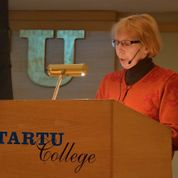
Dr. Sirje Kivimäe lectured on this subject on Tuesday, February 11 in the Tartu College hall. The audience was not especially large due to the weather conditions, but there was a noticeable air of curiosity in the spare auditorium. As we heard, there were even some telephone inquiries from those interested who wanted more exact information on the subject.
The suspense subsided when the supporting material on powerpoint revealed that we were talking about the end of the eighteenth and beginning of the nineteenth centuries. This was the time of the struggle over the question of abolishing serfdom. The Estonian people were ruled by a conservative nobility, who tried at all costs to remain in power and fought against interference with state power over the question of the status of the peasantry. To this end it was necessary to show the peasant as every bit the nitwit who was unworthy of more freedom and to whom giving an education was dangerous.
As a counterweight the so-called enlightenment movement arose, borne by educated Baltic Germans, for whom one institutional structure of expression was the freemason lodges which appeared in Estonia. The speaker gave a number of examples of key figures who began to develop cultural activity in Estonia, and who in the process oriented to the countryfolk as people forced into serfdom and artificially inhibited in their development. Many of the bearers of this idea belonged to the freemasons and some of them were illuminati.
Serfdom was abolished in Estland (Eestimaa, the duchy, the governorate) in 1816, and in Livland three years later. Even the first Estonian national song festival in the year 1869 saw fruition on account of Jannsen’s presenting it to the state power as the fiftieth anniversary of the emancipation of the Livonian peasantry.
The discussion that followed the presentation was exceedingly lively, with lots of questions. Here and there the conversation tended to slip onto the subject of contemporary freemasonry, which does not have much to do with Estonian peasants. Understandably, a movement whose aims are shrouded in secrecy gives rise to speculative opinions. Younger listeners seemed to have difficulty comprehending who at the time really ruled the Estonian people. The control of the Russian czar was in force over the land, but it was the German baron that the people learned to hate, as he had authority and power over peasantry.
























